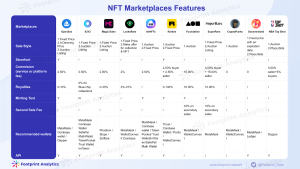
Blockchain technology has revolutionized industries ranging from supply chain management and healthcare, finance, real estate and voting systems. Its decentralized, immutable and transparent characteristics ensure data integrity while simultaneously increasing efficiency.
However, “blockchain” often brings to mind cryptocurrency and does not do justice to this revolutionary technology which can have far greater disruptive power than just Bitcoin alone.
Supply Chain Management
Supply chain management (SCM) is an essential aspect of business that helps companies cut unnecessary costs while simultaneously expediting product deliveries faster to customers. Blockchain can facilitate SCM by eliminating intermediaries and lowering transaction fees.
Blockchain provides immutable records of transactions, guaranteeing transparency and eliminating fraud. This feature is particularly useful during food safety alerts as it enables fast tracking of potentially contaminated products quickly. Furthermore, ethical sourcing practices and sustainability principles may also benefit.
Factom has made use of blockchain technology to establish a secure ledger of land titles which could reduce property registration fees while increasing transparency throughout India.
Financial Services
When most people hear the term blockchain, their thoughts might turn towards Bitcoin–the digital currency that’s attracted such widespread interest among investors and technology enthusiasts alike. But blockchain’s reach extends far beyond cryptocurrencies alone.
Blockchain has revolutionized the financial industry by eliminating intermediaries and cutting costs while increasing transparency, transparency, and regulatory compliance. From cross-border payments and asset management to lending and crowdfunding, this decentralized ledger is making waves throughout all financial segments.
Blockchain is making life easier for two billion unbanked people worldwide by helping them establish valid title claims to land and access loans. Furthermore, its traceability facilitates better treatment of incurable diseases.
Healthcare
Healthcare organizations generate enormous volumes of information that must be stored safely. Blockchain can secure this data with only authorized individuals having access to it.
Frost and Sullivan believes blockchain could enhance medical device identification and trackability, increasing patient safety while decreasing expensive repurchasing.
Patients also require control of their data, and blockchain technology could enable this by allowing them to decide who has access to their records and grant or withdraw permissions as necessary. It could also enhance clinical trial data management, streamline pharmaceutical supply chain tracing, ensure authenticity of drugs and even facilitate real estate tokenization for faster transactions that are secure and transparent.
Energy
While blockchain has often been associated with cryptocurrency trading, its effects can also be felt across many other industries beyond finance – supply chain management, healthcare, digital identity verification and many more.
Blockchains provide trustworthiness and security that is hard to match, while simultaneously reducing friction, costs, processing times and eliminating third parties altogether.
Researchers are already harnessing blockchains for timetamping, proof of patents and copyright, digitalized land registration, agricultural systems that adapt to climate change, as well as agricultural water management systems. Even the world’s two billion unbanked people could store their identities on blockchains to prove ownership of assets while meeting KYC and AML compliance requirements and access banking and loans more easily.
Digital Identity
Blockchain holds tremendous promise to transform digital identity systems by providing transparent, secure, and verifiable processes for data storage and verification. This could reduce fraud while improving transparency while decreasing costs – giving individuals control of their own data.
Brands like Google and Alphabet Inc are using blockchain technology to balance identification transparency with data security, while financial services firms are exploring its possibilities.
Blockchain technology has the potential to transform industries and commerce globally, from supply chain management and finance, healthcare records, digital identity creation, circular economy initiatives and tracking goods from production through production to recycling.
Tokenization
Blockchain’s distributed ledger technology ensures transparency and immutability, lowering fraud risk while speeding settlement times. Furthermore, its use enables the creation of stable coins as alternatives to traditional financial services that reduce transaction fees while increasing security.
Healthcare: Blockchain offers secure, transparent sharing of medical records between healthcare providers. Furthermore, it enables citizens to manage their personal data securely ensuring it only shared with authorized parties.
Tokenization is the practice of replacing sensitive data with unique token values while maintaining some elements from its original value (such as length or format) so as to maintain business continuity. This is accomplished by storing sensitive information outside an organization’s internal systems.







